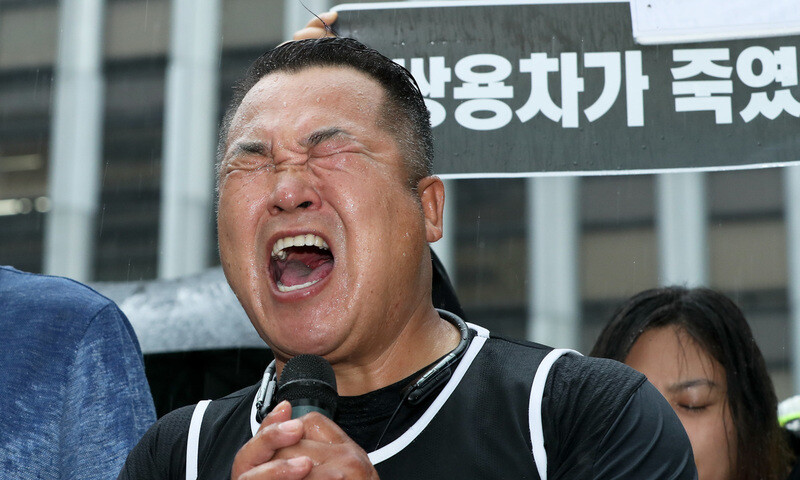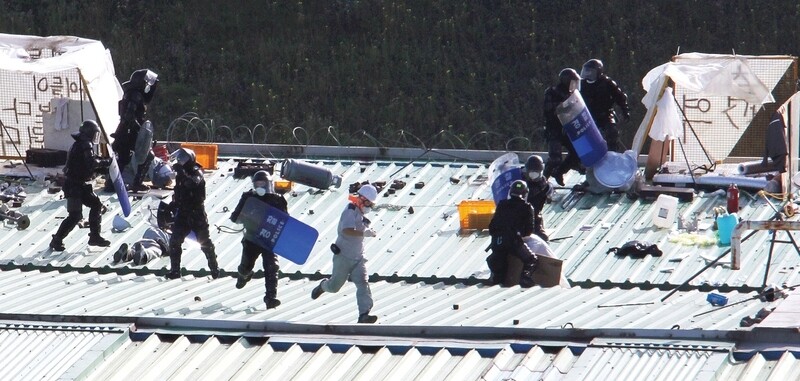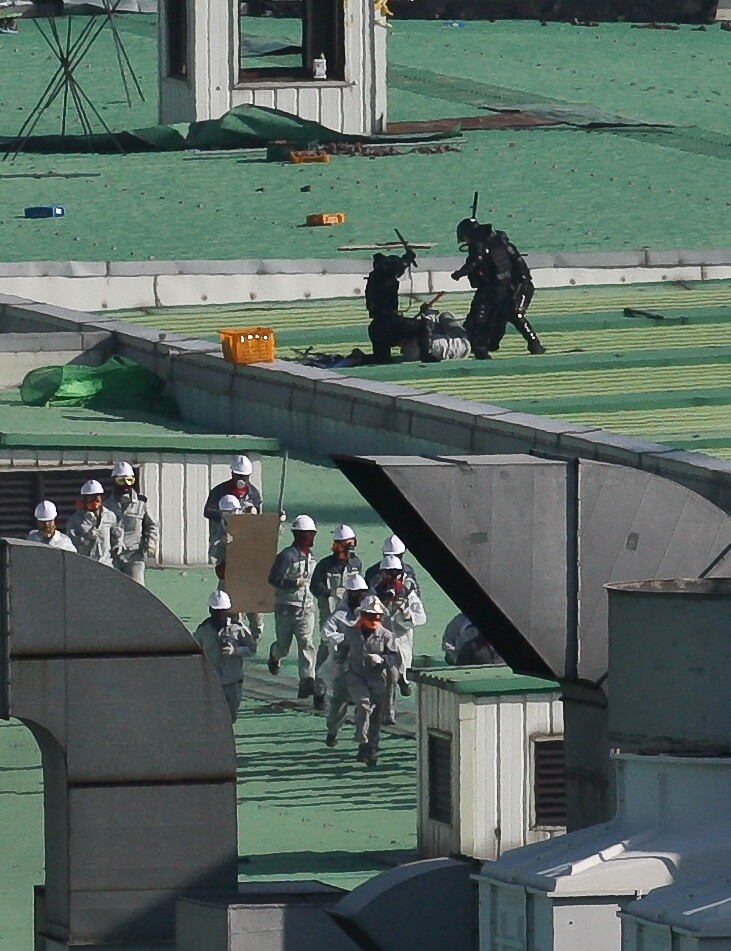hankyoreh
Links to other country sites 다른 나라 사이트 링크
SsangYong Motor union laborers gather in front of NPA to call for Lee Myung-bak’s prosecution

As rain poured down on the headquarters of South Korea’s National Police Agency (NPA), workers terminated from SsangYong Motor shouted slogans.
“They were killed by Lee Myung-bak!”
“Punish those responsible for state violence!”
The slogans were part of a press conference held in front of the NPA headquarters, in Seoul’s Seodaemun District, calling for the prosecution of former president Lee Myung-bak and former Gyeonggi Province Police Agency Commissioner Cho Hyun-oh.
The press conference was organized by the SsangYong Motor chapter of the Korean Metal Workers’ Union, associated with the Korean Confederation of Trade Unions (KCTU), and the SsangYong Motor Nationwide Action Committee after a fact-finding commission responsible for investigating cases of human rights abuses by the NPA concluded on Aug. 28 that the police’s crackdown on the SsangYong Motor union strike in 2009 had received final approval from the Blue House under former president Lee Myung-bak.
The participants in the press conference demanded that Lee should be held legally responsible for the police raid, since he was the one who gave it the final approval.
“Lee Myung-bak, the police, the prosecutors, the Ministry of Labor and the company rushed to carry out a joint operation that violently trampled on workers’ rights. We know that the Blue House gave the final approval, and the president at the time was Lee,” said Lee Sang-jin, vice chair of the KCTU.
“Since the statute of limitations is over, a special law should be passed to hold them responsible,” said Kim Deuk-jong, chair of the SsangYong Motor chapter of the Korean Metal Workers’ Union.
“I had to stand by and watch my colleagues being beaten and their lives endangered by the police commandos. That’s a pain I’ll never forget, even if I’m reinstated to my job. I really want to resolve this injustice,” said Kim Seon-dong, through his tears. Kim, one of the terminated workers, was camped out on the roof of the SsangYong Motor assembly facility when the police forced their way in.
“In July 2009, hired thugs beat me with steel pipes that left bruises all over my body. My ear was shot off by a slingshot round. The people who beat me haven’t been punished. They need to pay the price for their crimes,” said Kang Hwang-ju, another terminated worker.
Police mobilized antiterrorist manpower and weapons
According to the commission’s findings, police helicopters sprayed 200,000l of water mixed with tear gas – the main ingredient of which is a class-two carcinogenic – at the workers. There was also an attempt to force the workers to disperse using the blast of air from low-flying helicopters. Weaponry designated as antiterrorist equipment – including Tasers and multipurpose launchers – were also used against the workers.
Furthermore, evidence has emerged that when the police commando team (originally organized for use in antiterrorist operations) entered the factory, it carried out acts of violence intended to avenge colleagues injured during strike suppression. The commission concluded that such police behavior was illegal, since it violated the Act on the Performance of Duties by Police Officers and regulations about using hazardous police equipment. But the police can’t be held legally responsible for the illegal operation, since the statute of limitations has expired for all these crimes.
The participants in the assembly on Tuesday also said that another investigation should be held to get to the bottom of the suppression of the SsangYong strike, placing a particular emphasis on more than a hundred documents suspected of showing SsangYong Motor’s union busting.

Police closely coordinated with SsangYong Motor during strike
On Aug. 4, the Hankyoreh published a story about evidence that the police, prosecutors and Ministry of Labor had worked with SsangYong Motor to break the union. The story was based on documents acquired by the Hankyoreh that appear to have been written by the company when it was terminating its workers in 2009. The commission was unable to confirm whether the police or other government agencies attempted to work with the company to break the union.
“The National Police Agency needs to set up a special team of investigators to look into SsangYong Motor’s secret documents about the union that the commission didn’t get to. There also needs to be a special prosecutor and a parliamentary probe,” said Kim Deuk-jong, chair of the union chapter.

In fact, the police appear to have been closely involved in the negotiations between SsangYong Motor and the union at the time of the strike. During an interview with the Hankyoreh last month, Cho Hyun-oh said that a security intelligence office chief surnamed Joo and a superintendent surnamed Kim had mediated between labor and management. This same Kim was recently arrested on charges of receiving more than 60 million won (US$54,213) in compensation for helping Samsung Electronics Service deal with its union during management-labor negotiations.
“It’s taken far too long to bring state violence into the light. Now that 30 people have already lost their lives, it’s time for the state to take responsibility for the workers on whose rights it has trampled,” said Lee Tae-ho, chair of the operating committee for the Civil Society Organizations Network in Korea, during the press conference.
By Lim Jae-woo and Jung Hwan-bong, staff reporters
Please direct comments or questions to [english@hani.co.kr]

Editorial・opinion
![[Guest essay] Maybe Korea’s rapid population decline is an opportunity, not a crisis [Guest essay] Maybe Korea’s rapid population decline is an opportunity, not a crisis](https://flexible.img.hani.co.kr/flexible/normal/500/300/imgdb/original/2024/0430/9417144634983596.jpg) [Guest essay] Maybe Korea’s rapid population decline is an opportunity, not a crisis
[Guest essay] Maybe Korea’s rapid population decline is an opportunity, not a crisis![[Column] Can Yoon steer diplomacy with Russia, China back on track? [Column] Can Yoon steer diplomacy with Russia, China back on track?](https://flexible.img.hani.co.kr/flexible/normal/500/300/imgdb/original/2024/0430/1617144616798244.jpg) [Column] Can Yoon steer diplomacy with Russia, China back on track?
[Column] Can Yoon steer diplomacy with Russia, China back on track?- [Column] Season 2 of special prosecutor probe may be coming to Korea soon
- [Column] Park Geun-hye déjà vu in Yoon Suk-yeol
- [Editorial] New weight of N. Korea’s nuclear threats makes dialogue all the more urgent
- [Guest essay] The real reason Korea’s new right wants to dub Rhee a founding father
- [Column] ‘Choson’: Is it time we start referring to N. Korea in its own terms?
- [Editorial] Japan’s rewriting of history with Korea has gone too far
- [Column] The president’s questionable capacity for dialogue
- [Column] Are chaebol firms just pizza pies for families to divvy up as they please?
Most viewed articles
- 1Under conservative chief, Korea’s TRC brands teenage wartime massacre victims as traitors
- 2Months and months of overdue wages are pushing migrant workers in Korea into debt
- 3First meeting between Yoon, Lee in 2 years ends without compromise or agreement
- 4[Guest essay] Maybe Korea’s rapid population decline is an opportunity, not a crisis
- 5[Column] Can Yoon steer diplomacy with Russia, China back on track?
- 6‘We must say no’: Seoul defense chief on Korean, USFK involvement in hypothetical Taiwan crisis
- 7After election rout, Yoon’s left with 3 choices for dealing with the opposition
- 8Dermatology, plastic surgery drove record medical tourism to Korea in 2023
- 9[Column] Behind factional animus of Korean politics, victim mentality festers
- 10[Exclusive] Hanshin University deported 22 Uzbeks in manner that felt like abduction, students say